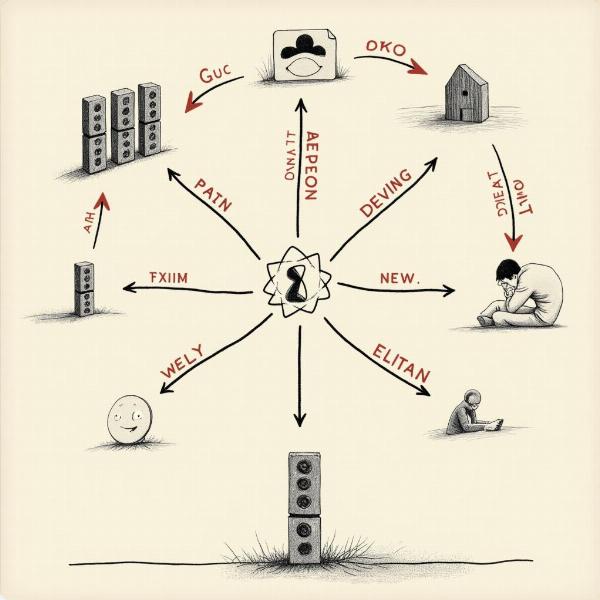Deterministic meaning in hindi revolves around the concept of निश्चितता (nishchitatā), which translates to certainty or definiteness. Understanding this concept requires exploring how it applies to various fields, from philosophy and physics to computer science and everyday language. Essentially, something deterministic implies a predictable outcome based on a set of known conditions, devoid of randomness or chance.
Understanding Determinism: A Deep Dive
Determinism, at its core, posits that all events are predetermined by previously existing causes. This concept has profound implications for how we perceive free will, causality, and the very nature of reality. In the Indian philosophical context, deterministic ideas can be found in various schools of thought, including certain interpretations of Karma and the concept of destiny. Imagine a domino effect – the fall of each domino is inevitable, determined by the push of the first one. This analogy, while simplified, illustrates the fundamental principle of deterministic meaning.
Determinism in Philosophy: Is Free Will an Illusion?
The philosophical implications of determinism are vast and often debated. If all events are predetermined, does this negate the existence of free will? This question has puzzled philosophers for centuries and continues to be a topic of active discussion. Some argue that free will is an illusion, while others propose compatibilist views that attempt to reconcile determinism with free will. In the Indian context, the concept of Karma can be interpreted as a form of determinism, where past actions dictate future experiences.  Deterministic Meaning in Philosophy
Deterministic Meaning in Philosophy
Determinism in Science: From Physics to Computer Science
Determinism also plays a crucial role in scientific disciplines. Classical physics, for instance, largely operates under deterministic principles. Knowing the initial conditions of a system allows us to predict its future state with a high degree of accuracy. However, quantum mechanics introduces an element of indeterminacy, challenging the deterministic worldview. In computer science, deterministic algorithms always produce the same output for a given input, making them predictable and reliable.
Deterministic Meaning in Everyday Hindi
While the philosophical and scientific aspects of determinism can be complex, its essence can be observed in everyday language. When we say something is “nishchit” (निश्चित), we imply certainty and a lack of ambiguity. For example, “vah nishchit roop se aayega” (वह निश्चित रूप से आएगा) – “He will definitely come” – expresses a deterministic belief in his arrival. This demonstrates how the concept of determinism permeates our language and influences how we express certainty and predictability.
How to Use “Nishchit” and Related Terms
Understanding the nuances of “nishchit” and related terms like “pakka” (पक्का) and “tay” (तय) is crucial for effective communication in Hindi. While they all convey a sense of certainty, their usage can vary depending on the context. “Pakka” often implies a stronger conviction or guarantee, while “tay” can refer to something that has been decided or fixed. Choosing the right word can subtly alter the meaning and emphasis of a sentence.
Is Everything Truly Deterministic?
The question of whether everything is truly deterministic remains a topic of ongoing debate. While classical physics suggests a deterministic universe, quantum mechanics introduces uncertainty at the fundamental level. This raises questions about the limitations of our understanding and the possibility of inherent randomness in the fabric of reality.
Conclusion
Deterministic meaning in Hindi encompasses a wide range of interpretations, from philosophical discussions on free will to scientific principles of predictability. Understanding the nuances of “nishchit” and related terms allows for more precise and nuanced communication. While the debate about whether our universe is truly deterministic continues, the concept itself provides a valuable framework for understanding causality, certainty, and the interplay between past, present, and future.
FAQ
-
What is the opposite of “nishchit” in Hindi? The opposite of “nishchit” can be expressed using words like “anishchit” (अनिश्चित) meaning uncertain, or “asambhav” (असंभव) meaning impossible.
-
How does Karma relate to determinism? Some interpretations of Karma align with deterministic principles, suggesting that past actions predetermine future experiences.
-
Is determinism compatible with free will? This is a complex philosophical question with no easy answer. Compatibilists argue that free will and determinism can coexist, while others maintain that they are mutually exclusive.
-
How is determinism applied in computer science? Deterministic algorithms produce the same output for a given input, ensuring predictability and reliability in computations.
-
What does “tay” mean in Hindi? “Tay” (तय) means fixed, decided, or certain.
Related Articles
Meaning-Hindi.in offers professional translation services for a wide range of needs, from business and legal documents to technical manuals and website localization. Our team of expert linguists ensures accurate and culturally sensitive translations for your specific requirements. We specialize in delivering high-quality translations for businesses, legal professionals, educational institutions, and individuals. Contact us today for a free quote at [email protected] or call us at +91 11-4502-7584. Meaning-Hindi.in is your trusted partner for all your Hindi translation needs.